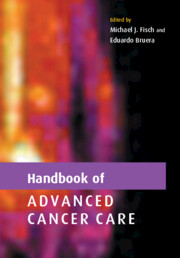Book contents
- Frontmatter
- Contents
- List of contributors
- Preface
- Acknowledgements
- PART I General concepts in oncology
- 1 Principles of diagnosis and staging
- 2 Principles of palliative chemotherapy
- 3 Principles of palliative surgery
- 4 Radiotherapy for palliation of symptoms
- 5 ABCs of clinical trials
- 6 Principles of cancer rehabilitation
- 7 Principles of palliative nursing
- 8 Ethics of decision making towards the end of life
- 9 Breaking bad news
- 10 The use of complementary/alternative medicine
- 11 Understanding “hospice”
- 12 Practical aspects of home care
- 13 Cultural differences in advanced cancer care
- 14 Implementing social services
- 15 Pastoral care
- 16 Bereavement
- Part II Primary tumors
- Part III Management of specific symptoms and syndromes
- Index
- References
9 - Breaking bad news
Published online by Cambridge University Press: 04 August 2010
- Frontmatter
- Contents
- List of contributors
- Preface
- Acknowledgements
- PART I General concepts in oncology
- 1 Principles of diagnosis and staging
- 2 Principles of palliative chemotherapy
- 3 Principles of palliative surgery
- 4 Radiotherapy for palliation of symptoms
- 5 ABCs of clinical trials
- 6 Principles of cancer rehabilitation
- 7 Principles of palliative nursing
- 8 Ethics of decision making towards the end of life
- 9 Breaking bad news
- 10 The use of complementary/alternative medicine
- 11 Understanding “hospice”
- 12 Practical aspects of home care
- 13 Cultural differences in advanced cancer care
- 14 Implementing social services
- 15 Pastoral care
- 16 Bereavement
- Part II Primary tumors
- Part III Management of specific symptoms and syndromes
- Index
- References
Summary
Background
Advances in cancer treatment have resulted in decreases in the incidence of most cancers and also increased patient survival. However, physicians treating cancer patients can expect that, for many patients, the hope of cure, treatment benefit, or sustained remission will not be met. Even for patients who have satisfactory outcomes there are many times during the course of the illness where the physician must undertake the difficult and unavoidable task of conveying unfavorable information about the illness or discussing emotionally charged issues such as
the diagnosis of cancer (especially when metastatic disease has been found)
cancer recurrence, spread of disease or failure of treatment to affect disease progression
the presence of irreversible disease or of serious treatment toxicity
hospice care and cardiopulmonary resuscitation when no further treatment options exist
positive results of genetic tests.
Goals of giving bad news
Studies have shown that in Western societies most patients desire to have complete information about their illness, its prognosis, and treatment possibilities.– Many also wish to participate in the important decisions about cancer treatment. Although bad news often upsets the patient, the physician can move from being the messenger of bad news to actually promoting coping by providing empathic understanding and concern. Employing communication skills in addressing patient's emotional needs are an expression of solidarity and can enhance the patient's trust and confidence in the physician.
What is bad news?
Bad news may be defined as “any information that seriously and adversely affects one's view of the future.
- Type
- Chapter
- Information
- Handbook of Advanced Cancer Care , pp. 70 - 87Publisher: Cambridge University PressPrint publication year: 2003



